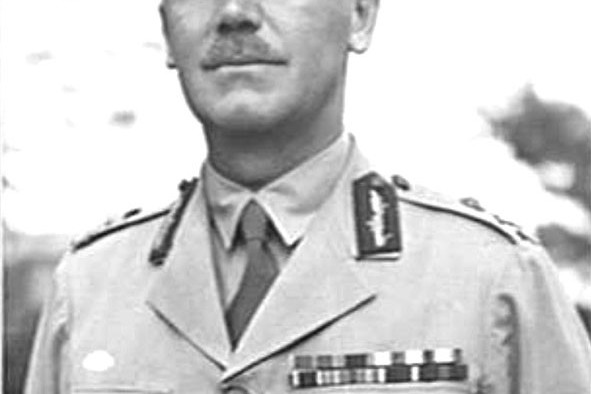General News
4 July, 2024
Sir Edmund Herring and “a lifetime of exceptional public service” — By Brian Lennen
The third of five children, born in 1892 in Maryborough, to Edmund Selwyn Herring and Gertrude Stella Herring, both solicitors. They were brought up in a sheltered way with Gertrude carefully monitoring their associates. Their father’s passion for...

The third of five children, born in 1892 in Maryborough, to Edmund Selwyn Herring and Gertrude Stella Herring, both solicitors.
They were brought up in a sheltered way with Gertrude carefully monitoring their associates.
Their father’s passion for cricket exposed them to a wider social group. The father and sons played with distinction against local and Melbourne teams.
He had layed a pitch at Tiverton (the family home), now occupied by Simon and Julie Sheed.
Education at the turn of the century was provided up to 8th grade. Beyond that the schools were private and exclusive (usually for the children of the affluent).
Edmund attended Maryborough College run by Joseph Warren. The school closed upon the opening of the High School in 1912.
He and his brothers attended Melbourne Grammar as boarders and his sister at Firbank.
Edmund flourished at Melbourne Grammar excelling at all facets of learning and sporting pursuits.
The school recognised his talents by appointing him with the honour of being school captain and dux.
His excellence was capped with the awarding of a “Rhodes Scholarship”, entitling him to three years at Oxford University. At age 19 he was the youngest to receive the honour.
In 1913 while still at Oxford he enlisted as a trooper in King Edward’s Cavalry in the British Army.
In 1914 he was commissioned as a second lieutenant and posted to the Western Front.
From there he was transferred to Greece where he was given an observation post.
This was highly dangerous with a heavy mortality rate.
After an 18 hour posting he was relieved and his replacements were immediately hit by a shell and killed.
Herring returned to his post the next day and provided invaluable evidence of the enemy’s movements.
For his courage under heavy shellfire, he was awarded the first of many distinctions, receiving the Distinguished Service Order (DSO) and the Military Cross (MC) for “conspicuous gallantry and devotion to duty”.
He returned to Australia in 1920 and soon after married Mary Ranken Lyle in 1922.
She practised as a surgeon at the Royal Melbourne Hospital. They had three daughters.
Herring worked as a barrister and lectured at Melbourne University. In 1936 he became a King’s Counsel.
Edmund was a conservative, he was elected to the Melbourne Club, an exclusive, conservative men’s only club.
He was a foundation member of Robert Menzie’s Young Nationals.
His political ambitions were thwarted when he missed pre-selection for Prahan.
In 1936 he stood for the seat of Brighton but was narrowly defeated.
In 1939 he was appointed as Commander Royal Artillery, of the 6th Division.
During World War II, the Division encountered many difficulties with equipment and the British soldiers. In the Greek campaign he had command of Australian, New Zealand and British artillery — they halted but were unable to stop the enemy advance.
In 1942 with the war moving to the Pacific he was given command of Northern Territory forces. When Darwin was being bombed, General Blamey summoned him to join him in Port Moresby to organise the logistics of supplies.
He opened up the Kokoda trails, developed airstrips in the jungle and doubled the ports capacity. All were vital cogs in the campaign.
During this period Herring was twice hospitalised with malaria.
On returning he severley reduced the Japanese positions in Buna and was awarded the Knights Commander of the Order of the British Empire.
Despite illness and inflexibility on both sides, the value of his work would be recognised in hindsight.
On February 2, 1944 the Victorian Government appointed Herring as Chief Justice of the Supreme Court of Victoria (a position he held for 20 years).
He earned a reputation as a fine judge and able administrator.
He stayed on as Lieutenant Governor until his 80th birthday in 1972 serving in the position for a record 27 years. For this service he was made a Knight Commander of the Order of St Michael and St George.
Portraits of Lieutenant General Sir Edmund Herring are hung in the Australian War Memorial.
William Dargie’s portrait of Herring won the Archibald Prize in 1945.
He was also recognised for innumerable service to the Boy Scouts, Melbourne University, the Shrine of Remembrance, Oxford University, the Anglican Church and a fellow of Trinity College Melbourne.
After an amazing life of service and achievements, Sir Edmund passed away in Melbourne on January 5, 1982 at the age of 89.
His life was celebrated with a state funeral held at St Paul’s Cathedral.
Edmund’s brother, Jack, also a solicitor, bought into the legal business in Maryborough with Lloyd Bathurst.
When it came to cricket, he was an attacking batsman who scored freely against all teams.
His father Edmund Selwyn played into his late 60s and featured with bat and ball.
According to cricket historian Ron Sinclair, he was the saviour of cricket in Maryborough.
The third brother Maurice, also played with distinction but moved to Melbourne at a young age.
Rob Herring was the most prolific of the family scoring three double centuries, 292 against Moliagul, 206 versus Victoria and 219 again against Moliagul.
Although unhappy in Melbourne hewent on to represent Victoria in Shield cricket.